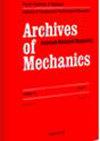Fast GPU simulation of reinforced concrete at the scale of reinforcement ribs by the discrete element method
IF 1.2
4区 工程技术
Q3 MATERIALS SCIENCE, CHARACTERIZATION & TESTING
引用次数: 2
Abstract
The paper presents the development of the GPU-based discrete element method (DEM) code for simulating damage and fracture of cohesive solids with application to reinforced concrete at the scale of reinforcement ribs. The solid volume of concrete and steel is modelled by bonded spherical particles. Very fine discretization, containing more than million particles, is applied to describe the 3D reinforcement bar geometry at the scale of ribs and to investigate cracking behaviour of concrete near the reinforcement bar. The numerical model is validated by using experimental results of the double pull-out test. Influence of the discretization scale to the numerical solution is evaluated by using the reinforcement strain profiles and the cracking patterns. The developed GPU-based DEM algorithm efficiently handles interaction of particles, does not require any atomic operation and allows performing fast damage and fracture simulations with large number of particles. The performance measured on GPU is compared with that attained on different CPUs for varying number of particles. The high value of the Cundall number (particle number multiplied by time steps computed per second) equal to 4.3E+07 is measured on NVIDIA® Tesla™ P100 GPU in the case of 1858560 particles.基于离散元法的钢筋混凝土配筋快速GPU模拟
本文介绍了基于GPU的离散元法(DEM)代码的开发,该代码用于模拟粘性固体的损伤和断裂,并应用于钢筋混凝土中的钢筋肋尺度。混凝土和钢的固体体积是通过粘结的球形颗粒建模的。包含超过一百万个粒子的非常精细的离散化被应用于描述肋尺度的三维钢筋几何结构,并研究钢筋附近混凝土的开裂行为。利用双抽拉试验的实验结果对数值模型进行了验证。利用钢筋应变剖面和裂缝模式,评估了离散化尺度对数值解的影响。所开发的基于GPU的DEM算法有效地处理粒子的相互作用,不需要任何原子操作,并允许对大量粒子进行快速损伤和断裂模拟。在GPU上测量的性能与在不同粒子数量的CPU上获得的性能进行了比较。在NVIDIA®Tesla上测得的Cundall数(粒子数乘以每秒计算的时间步长)的高值等于4.3E+07™ P100 GPU在1858560个粒子的情况下。
本文章由计算机程序翻译,如有差异,请以英文原文为准。
求助全文
约1分钟内获得全文
求助全文
来源期刊

Archives of Mechanics
工程技术-材料科学:表征与测试
CiteScore
1.40
自引率
12.50%
发文量
0
审稿时长
>12 weeks
期刊介绍:
Archives of Mechanics provides a forum for original research on mechanics of solids, fluids and discrete systems, including the development of mathematical methods for solving mechanical problems. The journal encompasses all aspects of the field, with the emphasis placed on:
-mechanics of materials: elasticity, plasticity, time-dependent phenomena, phase transformation, damage, fracture; physical and experimental foundations, micromechanics, thermodynamics, instabilities;
-methods and problems in continuum mechanics: general theory and novel applications, thermomechanics, structural analysis, porous media, contact problems;
-dynamics of material systems;
-fluid flows and interactions with solids.
Papers published in the Archives should contain original contributions dealing with theoretical, experimental, or numerical aspects of mechanical problems listed above.
The journal publishes also current announcements and information about important scientific events of possible interest to its readers, like conferences, congresses, symposia, work-shops, courses, etc.
Occasionally, special issues of the journal may be devoted to publication of all or selected papers presented at international conferences or other scientific meetings. However, all papers intended for such an issue are subjected to the usual reviewing and acceptance procedure.
 求助内容:
求助内容: 应助结果提醒方式:
应助结果提醒方式:


